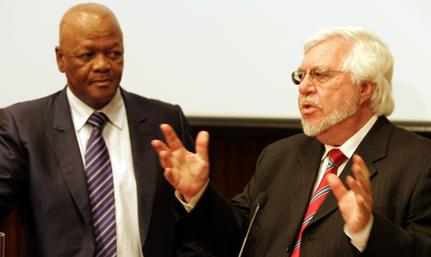Minister Jeff Radebe commends UFS for measures taken to address racial prejudices
|
 |
| 18 October 2013 |
Mr Jeff Radebe, Minister of Justice and Constitutional Development, last night delivered a lecture in the Prestige series of the Dean: Faculty of Law, at the Bloemfontein Campus of the University of the Free State (UFS).
In a packed hall with, among others, university students, staff and members of the judicial system, Minister Radebe said that many other academic institutions should look to the UFS when they deal with the challenges of racism in its various manifestations in their midst. “I commend the university for taking drastic measures to address the challenges of racial prejudices in its own backyard,” he said.
“Government can and must provide leadership, but it is the collective efforts of all our people that will ensure that we bridge the racial and historical divides that stand in contrast to our noble virtues as entailed in the Constitution,” the Minister said.
On the topic “Access to Justice” the Minister said that the Department of Justice and Constitutional Development has channelled more than 80% of its nearly R16 billion budget to the Access to Justice programme.
Minister Radebe talked about the reintroduction of the Sexual Offences Courts, which attests to the unrelenting resolve to eliminate the scourge of gender-based violence. “Fifty-seven of the department’s Regional Courts are being upgraded to operate as dedicated Sexual Offences courts during the 2013/2014 financial year. We believe that these sexual offences courts will help address the growing challenge of sexual offences in the country, particularly against vulnerable groups.”
The Minister also pleaded with law teachers to avail themselves to preside in the courts in our country to complement the decreasing number of presiding officers that are drawn from the attorneys’ and advocates’ profession. These services are normally rendered by the Commissioners pro bono as part of an endeavour to bring justice to all the people, including the poor.
A challenge that the UFS could help resolve,is the transformation of the legal profession. “We need to increase the number of Law students and in turn increase the number of attorneys and advocates in the pool from which we derive candidate judges,” Mr Radebe said.
The Legal Practice Bill and the transformation of the State Legal Service are the most important initiatives underway by which the Institutions of Higher Learning will make a contribution. “The Bill seeks to establish a single regulatory structure, which will be responsible for setting the norms and standards for all legal practitioners. Members of the public, as primary beneficiaries of the legal profession, will also be represented in this structure. Other important objectives of the Bill are the removal of barriers of entry to the profession for young law graduates who aspire to pursue a legal career, and the introduction of measures aimed at ensuring that fees chargeable for legal services are reasonable and within reach of ordinary citizens,” he said.
The Minister concluded: “Our courts must reflect both the race and gender demographics of our country and so must the university communities in their various capacities as a microcosm of the society we seek to build.”